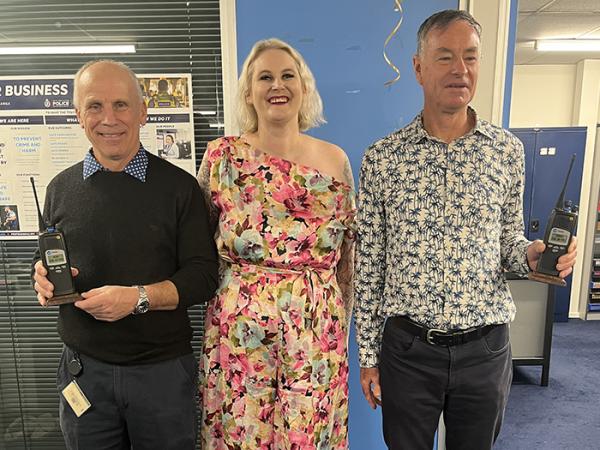Tony Corlett and Ron Van Oosterom have kept police radios crisp and clear for critical communications for almost 80 years between them.
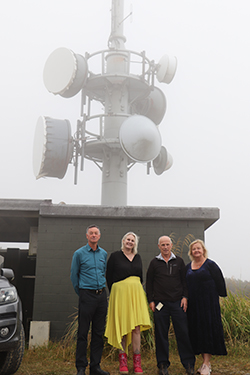 In the closing days of their careers, both District Service Engineers invited Ten One to one of their ‘offices’ in Upper Hutt.
In the closing days of their careers, both District Service Engineers invited Ten One to one of their ‘offices’ in Upper Hutt.
Masked in mist 700 metres above sea level is a communications tower studded with dishes receiving and beaming officers’ messages. (Pictured in front of the mast, right, is, from left: Tony, District Engagement and Support Manager for the Lower North Island Natalie Grace, Ron and Head of ICT Engagement and Support, Justine Maddock.)
A snowstorm severed mains power to this site in the mid-nineties. Standby batteries left police radios on borrowed time until Ron and Tony were dropped in by helicopter to connect a temporary generator and keep officers on the air.
A recent challenge was solving a communications conundrum along a new motorway north of Wellington, afflicted by radio blackspots owing to the terrain.
“Several factors meant we were unable to access Transmission Gully for three years," says Tony. "It was built and opened before we could gain entry, bring in power and build a tower.”
Tony took his expertise to the Chatham Islands twice – once to support STG. He can’t pinpoint when, although it was some time ago, as he travelled on a now-decommissioned Andover aircraft. What Tony does remember is the sight of a police dog wearing an oxygen mask on a less-than-steady flight.
As for a quirky callout, Ron recalls investigating how the old Johnston St Police Station in Wellington plunged into darkness. Some fossicking around found blown fuses and the culprit: a toasty pie maker.
Ron and Tony came to Police in the 1980s after radio engineering experience in NZ Railways and NZ Post Office respectively.
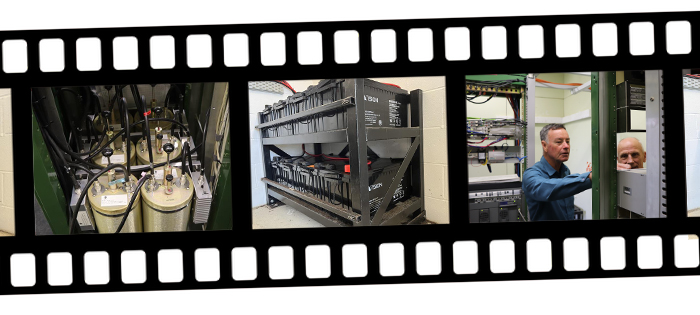
Ron and Tony's world of tech.
In the pair’s time, equipment and parts have changed remarkably: waxed twine being swapped out for cable ties, solid-state replacing valves and onto today’s technology.
“The biggest change is the condensing of electronics," says Ron. "In the old days you used to physically tune the radios and receivers. Today the computer sets it all up.
“We don’t do any physical repairs to radios. All the bits and pieces on the circuit board are so condensed it’s very difficult to unsolder them. It’s just board replacement these days.”
For Tony, another noticeable shift has been the introduction of what’s called network management. “We can log into things remotely. Being able to remotely view what is happening to our services is a huge advantage versus having to go on site each time.”
The introduction of encrypted digital radio into some districts from 2009 was another milestone. Assured that their communications were completely confidential, a survey showed officer-generated talk time over the radio increased by 150 per cent.
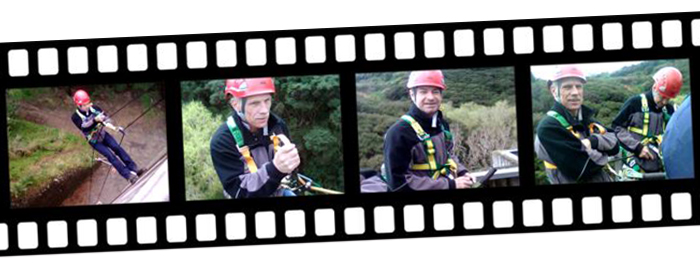
Learning the ropes for mast maintenance.
“We do get a lot of appreciation from the frontline about the work these guys do, whether it’s an operation or BAU," says Natalie Grace, District Engagement and Support Manager for the Lower North Island.
"Ron and Tony will say they’re doing their job so I’m pleased to remind them of the impact they make.
“It’s really difficult to replace Ron and Tony’s skillset. It is a bit of a dying art. I’m not going to get another Ron and Tony – as much as I’d love to.”
Justine Maddock, Head of ICT Engagement and Support, agrees. “We’ve got some great skills with Tony and Ron and we will miss that and miss them,” she says.
Golf, home maintenance and holidays await in retirement. As for the future of communications, both predict that satellites will play a bigger part. Watch this space.
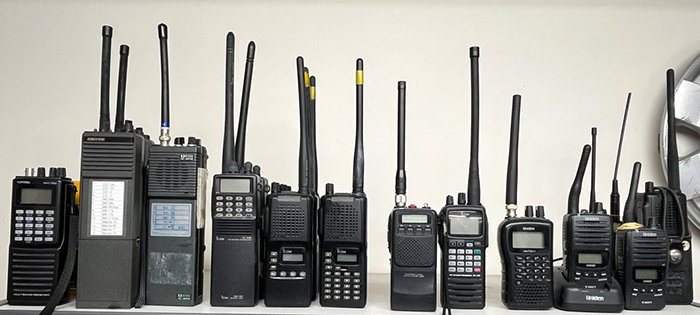
Radio times - Police handsets through the years.

